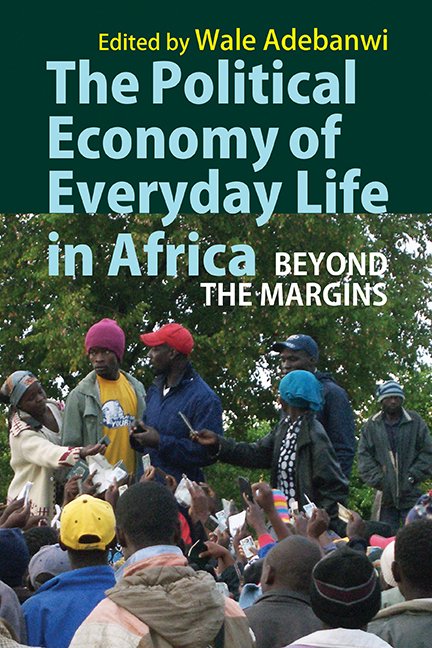Book contents
- Frontmatter
- Dedication
- Contents
- Maps, Illustrations & Tables
- Notes on Contributors
- Foreword
- Acknowledgements
- Approaching the Political Economy of Everyday Life An Introduction
- Part I MONEY MATTERS: CURRENCY & FISCAL LIFE STRUGGLES
- 1 Cattle, Currencies & the Politics of Commensuration on a Colonial Frontier
- 2 Currency & Conflict in Colonial Nigeria
- 3 Coercion or Trade? Multiple Self-realization during the Rubber Boom in German Kamerun (1899–1913)
- 4 The Macroeconomics of Marginal Gains Africa's Lessons to Social Theorists
- Part II LABOUR, SOCIAL LIVES & PRECARITY
- Part III MARGINALITY, DISAFFECTION & BIO-ECONOMIC DISTRESS
- Part IV HISTORICITY, TEMPORALITY, AGENCY & DEMOCRATIC LIFE
- Afterword: The Landscapes Beyond the Margins Agency, Optimization & the Power of the Empirical
- Index
1 - Cattle, Currencies & the Politics of Commensuration on a Colonial Frontier
from Part I - MONEY MATTERS: CURRENCY & FISCAL LIFE STRUGGLES
Published online by Cambridge University Press: 31 August 2018
- Frontmatter
- Dedication
- Contents
- Maps, Illustrations & Tables
- Notes on Contributors
- Foreword
- Acknowledgements
- Approaching the Political Economy of Everyday Life An Introduction
- Part I MONEY MATTERS: CURRENCY & FISCAL LIFE STRUGGLES
- 1 Cattle, Currencies & the Politics of Commensuration on a Colonial Frontier
- 2 Currency & Conflict in Colonial Nigeria
- 3 Coercion or Trade? Multiple Self-realization during the Rubber Boom in German Kamerun (1899–1913)
- 4 The Macroeconomics of Marginal Gains Africa's Lessons to Social Theorists
- Part II LABOUR, SOCIAL LIVES & PRECARITY
- Part III MARGINALITY, DISAFFECTION & BIO-ECONOMIC DISTRESS
- Part IV HISTORICITY, TEMPORALITY, AGENCY & DEMOCRATIC LIFE
- Afterword: The Landscapes Beyond the Margins Agency, Optimization & the Power of the Empirical
- Index
Summary
Prefatory Note
Encounters between different regimes of value – regimes divided by cultural space and time – presume mediation, translation, communication and, therefore, currencies, at once verbal and material, that objectify them. This, in turn, depends on one thing above all else: on mechanisms of commensuration, mechanisms that render negotiable otherwise inimical, apparently intransitive, orders of signs and practices. Without such mechanisms, which have often been the object of conflict and contestation, large-scale historical projects, like colonialism, would have made no sense, neither as a world -undertaking on the part of colonizers nor as a lived reality to those upon whose worlds it was wrought. Jane Guyer (2004: 13), in an acute reading of the West African archive, warns against the assumption that commensuration, especially that attributed to the alchemy of money, necessarily dissolves all distinctions between disparate scales and measures of worth. In Africa, she insists, non-equivalent exchange has been pervasive. If anything, it has been facilitated by the spread of quantifiable currencies: as people became adept at deploying monetary scales, they frequently used them for negotiating intervals, ‘exchanging goods and services that were explicitly not the match of each other’ (47). In similar spirit, the following essay interrogates the role of commensuration in the colonial encounter: how might the management of value conversion – efforts, that is, both to facilitate and to impede it – play into larger processes of political contestation and incorporation at the edges of empire?
Introduction
Money is sacred, as everyone knows…
(Barry Unsworth 1992: 325)This essay explores a very specific obsession with very general historical implications: the effort of British Nonconformist evangelists – evangelists, that is, from Protestant denominations other than the established Church of England – to introduce coinage, to replace beads and cattle with banknotes, among Tswana peoples in South Africa. At its broadest, it posits a post-Marxist argument, rooted in the concerns of both Marxist and liberal theory, about the salience of commensuration in the modernist construction of society and history; above all, in the forging of empires. For, we shall claim, at the heart of all ‘modern’ colonialisms, a condition of their possibility perhaps, were mundane mechanisms that made inimical kinds of value, with different cultural roots, at once objectifiable, comparable and negotiable – mechanisms, that is, which permitted the up- and downloading of unlike forms of wealth, both human and inanimate.
- Type
- Chapter
- Information
- The Political Economy of Everyday Life in AfricaBeyond the Margins, pp. 35 - 71Publisher: Boydell & BrewerPrint publication year: 2017

